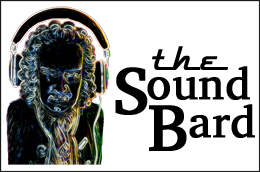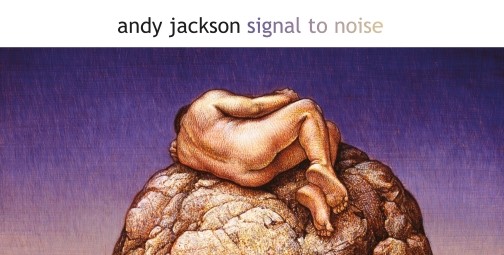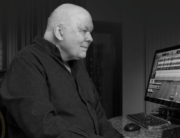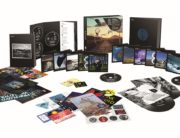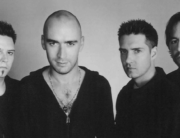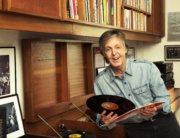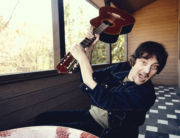BY MIKE METTLER – DECEMBER 26, 2014
 After a pair of masterful 5.1 surround-sound mixes for the 20th anniversary edition of Pink Floyd’s The Division Bell and the November release of The Endless River, one might think producer Andy Jackson would follow suit for his own first full-fledged progressive-leaning solo album — but you’d be dead wrong. Instead, the man’s mandate for the oh-so-appropriately named Signal to Noise (Esoteric Antenna) was strictly quad. “The concept of surround mixing is still developing,” says Jackson. “It’s certainly still developing for me. There’s a lot to play with. You go back to early stereo, and it was all really an extreme. People got more subtle about it and understood it better as time went on. Surround is proportionately that much more complex, and there are lots of ways of thinking about it.”
After a pair of masterful 5.1 surround-sound mixes for the 20th anniversary edition of Pink Floyd’s The Division Bell and the November release of The Endless River, one might think producer Andy Jackson would follow suit for his own first full-fledged progressive-leaning solo album — but you’d be dead wrong. Instead, the man’s mandate for the oh-so-appropriately named Signal to Noise (Esoteric Antenna) was strictly quad. “The concept of surround mixing is still developing,” says Jackson. “It’s certainly still developing for me. There’s a lot to play with. You go back to early stereo, and it was all really an extreme. People got more subtle about it and understood it better as time went on. Surround is proportionately that much more complex, and there are lots of ways of thinking about it.”
I wanted the two of us to think about it a bit more together, so, for this SoundBard exclusive interview, I gave Jackson a call across the Pond in early December to get the scoop on his choice of using four channels over six, receiving an unexpected Grammy nod, and discovering the joys of becoming a bona-fide songwriter. Let’s see just what a 5.1 master does while learning to fly solo.
Mike Mettler: Tell me your reasoning behind going with 4.0 instead of 5.1 for Signal to Noise.
Andy Jackson: For anyone who does surround mixing, the issue really is: How do you use the center and the sub? They’re really more for the cinema format. We find ways to use the center and the sub because they’re there, you know?
The center certainly performs a role in the cinema because there’s dialog and something happening on the screen when you’re not sitting in the middle in the theater. Anyone listening to music at home in surround is going to sit in the middle, so it’s going to be relevant. But if you put things like vocals in the middle, the tonality is different because it’s coming out of a single speaker rather than the stereo pair, so you don’t get that combing in the midrange. It never sits in the same way.
So with my album, I thought, “Well, I’m not answerable to anyone. I can do as I please.” I’m going to nail my colors to the mast and just do straight quad. To be honest, there’s a degree of fun to it as well — as in, “Well, why not? Why not do that?” It’s quite funny to see outright quad on the master rather than surround! What a wonderful retro feel about it. You only live once, so have a bit of fun. And I did.
It works really well, and for me, it’s very, very compatible with the stereo mix. It felt like the stereo mix expanded, rather than be something that didn’t quite fit in the same place. To me, it was a successful experiment. But I don’t think I’d do it with anybody else’s record, because people might complain! (laughs)
Mettler: Well, there’s nothing to complain about here, because I think you’re right. It’s very complementary to the stereo mix — though I have to admit I’m wholly partial to the quad. I feel like I’m in the middle of two fields working together — a front mix and a back mix that supplement rather than parallel each other.

Louder Than Words: Mettler and Jackson in the control room on the Astoria houseboat recording studio on the Thames, August 27, 2014, after listening to Pink Floyd’s The Endless River and discussing Jackson’s now-Grammy-nominated 5.1 mix for The Division Bell – 20th Anniversary Edition box set.
Jackson: Thanks. You know, when I did the Division Bell surround mix, the way I was thinking about it was that if you could “take” the stereo field, you’d stretch it around into a kind of horseshoe shape — the thinking being that it’s now like a horseshoe-shaped stereo. That’s how I was thinking about it at that time. But Al Schmitt, for example, he’d think of it as being a front stereo and a back stereo. That’s the way his records sound to me. And I know in speaking with James Guthrie [Floyd’s other main producer, who did the surround mixes for The Dark Side of the Moon and Wish You Were Here], he likes diverse-field stuff, where he’ll do things across diagonals, and other things he’s rather less discrete about.
Mettler: Did you do any work on this album on the Neve 88R console in the control room of the Astoria houseboat studio [which is moored on the Thames in Hampton, Middlesex, England]?
Jackson: You know, I didn’t do anything on that console! Signal to Noise is an “in the box” album. It’s not mixed analog. It was mixed in Cubase in the computer, since it’s essentially a “home” album. My studio is literally in my house.
For the quad, I just picked up my computer and took it down to the boat, because it has a better monitoring system. I still mixed it in the box, though; I didn’t change anything. I’m learning more and more about what sounds good that way. Bizarrely, as I found out recently, they were using 4-track plugins, and I learned Cubase’s own equalizer is actually really good. (chuckles)
Mettler: More than most, I think you understand the juxtaposition of time and space in a mix. You know how to put us, the listeners, in the middle of the field.
Jackson: Thank you. It’s down to the choices you make rather than the equipment. You know, maybe I could do more with the quad if I had a million quid to play with, but I like the fact that when you’re working in the box, whenever you boot it up, you’re right back in the session exactly where you left it. It’s an organic, growing mix, rather than just starting again on everything.
Mettler: Will you’ll do quad again for your next solo project, or. . .?
Jackson: I’ll certainly do it in surround, but I don’t know if it’ll be 5.1. I reserve the right to be inconsistent. (laughs)
Mettler: Ok, I’ll spot you that point. Before we go any further, I think some congratulations are in order for a couple of things. First, how about the tremendous success of The Endless River? That must feel quite good. [The Endless River debuted at #1 in the U.K. and over 20 other countries worldwide, and at #3 in the U.S. on the November 19, 2014 charts.] Did you talk with David [Gilmour] and Nick [Mason] about that?
Jackson: Yeah, yeah. We always knew it would divide people, but it’s been more favorable than we expected, to be honest. And that’s good.
Mettler: That’s great to hear. And second, how great it is for you to get a Grammy nomination for Best Surround Sound Album for the 5.1 mix you did for The Division Bell – 20th Anniversary Edition box set. How does that feel?
Jackson: I was quite surprised, actually. I suppose because The Endless River has been very much on my mind, then here comes that one (chuckles), which was all a long time ago. It [the box set] only just came out this year, but the album is 20 years old, and the mix is 10 years old. It’s quite strange, really. I didn’t know anything about it. There’s a surround-sound forum I go on to check on stuff, and it was them that told me! (laughs) I was like, “Really? Oh!”
Mettler: Always the last one to know, right?
Jackson: Mmm, I suppose so. It didn’t seem anyone in the Floyd organization knew about it! Oh well.
Mettler: The surround forums have generally good things to say about these mixes.

High Hopes: David Gilmour contemplates another mixing brick for The Division Bell. Photo by Jeremy Young.
Jackson: I went on there because I was curious what people thought about it. I ended up going on one of the forums, and it was their reaction to The Division Bell and some of the things about it that were done basically in quad that influenced some of the things I did on my album. It was interesting to see what the end user thinks of these things.
Mettler: The telling phrase to me for Signal to Noise is something you said in the song “Herman at the Fountain” — namely, “A full circle return.” I think that signifies what I’m listening to, in a way. Can we apply that thought to your horseshoe quad concept?
Jackson: Well, yes, to some extent, though you don’t quite get that “pushing in” there. It was less of a philosophical thing. I just did more of what amused me, really. I didn’t want the mixes falling apart. I’ve got my usual tricks and techniques, and it was just a question of getting it to where I liked it. It was less of an intellectual process than some of the other mixes I’ve done. I just dove in and did it.
Mettler: How long did you work on Signal to Noise?
Jackson: Over the period of a year, I suppose, from beginning to end. There were huge periods where I didn’t do anything, really, because I was working on Endless River. I was writing it at the same time. I was recording as I went, so I would stop for long periods while nothing was happening and I was busy doing something else. I wouldn’t write anything until something sprang to mind that I wanted to write about. I was building up a collection to the point of where I thought, “I’ve got enough for an album here.”
Mettler: It’s a full one-man show? You played everything yourself?
Jackson: I didn’t start off with that intention. The singing became the crucial thing. I’d never sung on an album before, and I certainly didn’t regard myself as a singer. Initially, I was going to get friends and people I’d worked with before to sing it. I tried some other people out on some songs and it was ok, but it wasn’t quite right, because this time I had written melodies, and I had written lyrics. And I began to realize, if it’s going to be my name on the front and not a band name, and I am not the singer, it’s going to be a bit odd. So I thought, “Well, let me see if I can sing it.” I had a go and didn’t like what I had done, so I took some singing lessons.
Mettler: What did you model your vocals after?
Jackson: I looked online for resources to see what was there and took online singing lessons to see what a professional would do. I took one session with a professional and thought it was all the same thing, really. I bought the course online, a box of MP3s. it’s just exercises, but it got me using my voice and made me aware of how I was using it. I kept plugging away until gradually I went from hating singing the songs to where I didn’t hate what I was hearing.
Mettler: Is there one particular singing tip that was the lightbulb-going-off-in-the-head moment?
Jackson: I suppose it was just an awareness of, “Ok, where am I producing the sound from?” — the balance of head tone and chest tone, what I was doing with my throat, and gradually eliminating the things that were making a “bad” sound, to make it better. Just repeating. Like if you want to build big muscles, you have to repeat it over and over again. It gets stronger, you get better, and you get a better sound and better pitching. Finally, it got to the point where it was acceptable to me.
I’d gone through the stage of playing the guitars and bass and programming the drums and keyboards and things, and then thought, “Well, why not make it all me?” Once I thought that, I quite liked that idea. But I wouldn’t necessarily do it again. I’ve started writing and working on the next one, and I’m quite keen on working with some other musicians this time.
There was something that was quite significant about it being 100 percent me, because the whole thing came about from being in a band for a while, and then stopping doing that and going out on my own.
Mettler: You’re talking about The Eden House.
Jackson: Yeah, it was great. I spent 3 years in Eden House, and it was terrific. But a band is always a compromise of what you like. Your takes overlap with everybody else’s takes, and it’s what you do. The bit in the middle wasn’t very big for me, and I wanted to do other stuff. It just led to this bit being 100 percent me. I’m glad, yeah. I’m really pleased that’s the case. I’m also really looking forward to working together with some other people next time.
Mettler: Can you tell me about the gear you used on this recording?
Jackson: Yeah, it was all done on Cubase — the old Cubase, Cubase 5; I’ve never upgraded. It’s a DAW [Digital Audio Workstation]. It’s fine, it does the job. That’s what we worked on in Eden House, so it was the same thing. It’s a shame you can’t go modular and build out all the bits you like.
I have decent front-end gear, some decent mike amps, some DAVs [DAV Electronics] — the same ones we used for David’s [Gilmour’s] touring rig — done by a British guy, a remake of an old discrete transistor mike amp that came out of Decca Studios. It’s a good, solid, big-sounding mike amp.
Microphones, I only used a few — some ADK Neumann clones, an 87 clone and a 67 clone [i.e., U87 and U67]. And Audio-Technica Neumann N47 clone. If you put them up against the real thing, they’re pretty close. Decent mikes. They’re also 20 percent of the price.
I did this all in my house, and with a 100-watt Hiwatt [amp] in my bedroom. It was my analog guitar rig, a proper separate pedalboard, Hiwatt head, and a Palmer speaker simulator, which is pretty good. It’s as good as getting a great speaker cab in a room miked up. I was either going to do it with the speaker sim, or I was not going to make the record.
Mettler: What guitars did you use?
Jackson: I’ve got far too many guitars. There are guitars on the album I don’t own anymore. (laughs) The main one, my #1, which I used in Eden House for a while, is a Duesenberg, a semi-hollow. I changed the pickups out. It’s got P90s, and that’s the one I used the most. It’s got a tone. A lot of P90s, and things like that. I don’t have any guitars with humbuckers on them; I just don’t like ’em.
I also used a Danelectro, which is great for slide. Acoustics were done with a Suzuki lawsuit-era Martin clone. Pretty reasonable stuff.
Mettler: Is there an actual name for the studio?
Jackson: No, it’s just my bedroom is all. (chuckles) I actually moved house during recording, so it was done in two spare bedrooms. It doesn’t have a name really, but I’ll come up with one eventually. It’s just a tiny little room, which is fine for me.
The thing about working at home in my bedroom — if I get an idea at midnight, I can go grab the headphones and do something on it. And that’s great, having that facility. I’m already here. All I have to do is walk upstairs and there we are, in the studio, straightaway.
Mettler: It’s probably hard for you to pick a favorite here, but I like how everything leads up to the epic final track, “Brownian Motion” — the big payoff.
Jackson: I think so. If I do have to pick one, I think it is “Brownian Motion.” I always do this — put the big one at the end. I like doing that as part of the structure of a record. The two big ones for me were the beginning and end points. “The Boy in the Forest,” being the lead track on the album, with all that’s happening there — almost oversaturating everything in that song.
Mettler: I like that it starts with the ping-pong sounds in the back channels, almost like I’m tuning between sessions to get the mix dialed in.
Jackson: Mmm. Yeah yeah yeah. That’s the whole thing with “Brownian Motion” too. There are lots of interesting sounds on this album. Go on the Internet and type in “50 interesting sci-fi sound effects,” and there’s loads and loads of stuff there, an endless source of material. You can take this stuff and mutate it, like I did on “Brownian Motion.” There’s loads of stuff I’ve messed around with there.
The one thing I didn’t use on this album, especially when it came to the drums, is VST [Virtual Studio Technology] instruments. Didn’t use that at all. There is a bit of sampled keyboards and mellotron, but they all came off a Kurzweil. I’m not really a keyboard player, so I didn’t really use any of that stuff at all. I mainly used guitars, because that’s my instrument.
Mettler: “Herman at the Fountain” has some mellotron samples, right?
Jackson: Yeah. it turns up in a few places, but it’s just a sample of a mellotron that I got on the Kurzweil. I’ve always loved mellotrons.
Mettler: It reminds me of the stuff King Crimson and The Moody Blues did with mellotron, and especially how [engineer] Derek Varnals handled Mike Pinder’s tracks.
Jackson: Yeah. And when you say King Crimson, that is from my formative years, for mellotron sounds.
Mettler: And Tony Banks, with Genesis —
Jackson: You’ve just hit it. That’s my age, my real formative years of music was mid-’70s British prog.
Mettler: Hey, that’s what we like. Your style here lends itself to this format, which I guess we can call prog.
Jackson: Yeah, though I don’t know what prog means anymore — or art rock, which is the same thing, really. It is what it is. It’s what I like. (laughs) I just make music I like.
Mettler: Well, remember, you’re officially an “artist” now.
Jackson: That’s nice, that’s lovely; thank you. It’s been a really invigorating thing to do because it’s exploring again, trying stuff that was hard, and trying stuff I couldn’t do — climbing new mountains and things. It’s been a fantastic experience. It really helped changed my way of thinking, all sorts of ways about things I do.
I’d always daydreamed of being a fantastic guitarist. Even that’s not so important to me now — I want to be an effective songwriter. If I never heard any new music I’d never heard before again, I could still get new experiences with music because I’m listening to the old stuff again in a new way. I’ve been listening to old Beach Boys stuff and thinking, “What the hell is he [Brian Wilson] doing with melodies here?” It’s interesting trying to think about what he’s doing there. He never ever has two syllables next to each other on the same note. Every time he moves to a new note. The way that Brian Wilson works, it’s really interesting to realize that. When I’m writing new stuff, I think, “Can I take that piece of knowledge about the way he works and apply it to what I do? Am I making something better by doing that?”
Hearing songs you like and working out the changes — that’s an amazing concept. What’s going on, and why? “Ok, they put the seventh in there.” That’s a whole new world of music I’ve got to explore, because I’m thinking about it in a whole new way.
Mettler: I love hearing his work broken down like that, especially on things like The SMiLE Sessions.
Jackson: I think Brian deserves the word “genius.” I don’t bandy that around lightly.
Mettler: And now you’re looking at things with your songwriter’s hat on.
Jackson: It’s a new way of thinking. Being a record-maker is fairly straightforward for me since I’ve done it so much. It just comes automatically.
Mettler: Well, I’ve already got the title for your next album. I think it has to be Wow and Flutter.
Jackson: (chuckles) Interesting, yeah, we could keep going with the theme! At the moment, I already have a different title, but we’ll have to see where it goes. It depends if the concept stays where I have it in my head, where I want it to be — somewhat from Endless River territory, but also from listening to something else. If you remember how records used to be sequenced, it was always this formulaic thing: fast song, slow song, fast song, slow song. I always thought, “No — when you get in a vibe, you want to stay there for a while, and have a slow arc.” I have the idea of actually making an album more like The Endless River, which is in “blocks” where you have 15 or 20 minutes of songs that segue together. I’d like to keep the mood all the way through in blocks like that.
Mettler: I like that idea. It’s like a live set, where you take people on an arc longer than you might on a record. I like being taken somewhere in that way. That’s pretty cool.
Jackson: Yeah, yeah. I mean, it’s early stages. But the way Signal to Noise has sold in its first few weeks out there is making me think, “Well, this is viable.” We’re already at the stage of talking to Mark [Powell] at the label, Esoteric [Antenna]. We’re already at the point where they want another one from me, so it’s great. I get to make another album.
But I will have to write a bit more. I’ve actually written half of it, but I can’t force the starting ideas. Once you actually start the album, I’m a strong believer in knuckling down and getting to work. If you sit around waiting for the muse, you just sit around not doing anything. Sometimes you’ve just got to go in. Blank sheet of paper, and start. Lyrics — what do I want to write about? I need to have sparks to write. But they come. If something happens in what I see or hear, and something sets a spark in me, I’ll write.
Mettler: I’m looking forward to that. I think Signal to Noise is a great beginning statement, so keep going. Keep doing.
Jackson: I will. The next one will be better. This is brilliant. This is what I always wanted to do, and I can’t believe it’s taken me this long to get around to doing it! (laughs)
